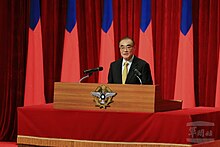Feng Shih-kuan
| Feng Shih-Kuan | |
|---|---|
| 馮世寬 | |
 |
|
| 32nd Minister of National Defense | |
|
Assumed office 20 May 2016 |
|
| Premier | Lin Chuan |
| Preceded by | Kao Kuang-chi |
| Personal details | |
| Born |
25 November 1945 Huai'an, Jiangsu |
| Nationality | Republic of China |
| Political party | Kuomintang (suspended) |
| Alma mater |
Republic of China Air Force Academy University of Southern California Armed Forces University |
| Military service | |
| Allegiance | Republic of China |
| Service/branch | Republic of China Air Force |
| Years of service | 1967-2006 |
| Rank | General |
Feng Shih-kuan (Chinese: 馮世寬; pinyin: Féng Shìkuān) is a Taiwanese politician. He served in the Republic of China Air Force from 1967 to 2006, retiring with the rank of General before assuming the post of Minister of National Defense in 2016.
Feng completed his Chinese Air Preparatory School of the Ministry of National Defense in 1963. He graduated from the Republic of China Air Force Academy in 1967. He obtained his Flight Safety Officer Class from University of Southern California in the United States in 1977. In 1981, he completed his study from the Armed Forces University in the Chinese Air Command and Staff College in 1981 and in the Chinese War College in 1988.
Feng was the Chairperson of the Aerospace Industrial Development Corporation from 2006 to 2008.
Feng was named Minister of National Defense in April 2016, a month before the Tsai Ing-wen administration was to take office. For accepting a post in a Democratic Progressive Party-led government, the Kuomintang suspended Feng's membership.
Speaking at the Foreign and National Defense Committee of the Legislative Yuan on 23 May 2016, Feng said that he would not support the Taiwan independence movement.
At 8:15 a.m. on 1 July, a Hsiung Feng III missile was inadvertently launched from a corvette docked at Zuoying Military Harbor. The strike hit the Taiwanese fishing boat Hsiang Li Sheng, killing the captain and injuring three of his crew. Feng arrived in Kaohsiung to deliver a personal apology to the fisherman's family the next day, but it was rejected.Zhang Zhijun, leader of the Taiwan Affairs Office, also asked for Taipei to adequately explain the incident, which was placed under investigation.
...
Wikipedia
